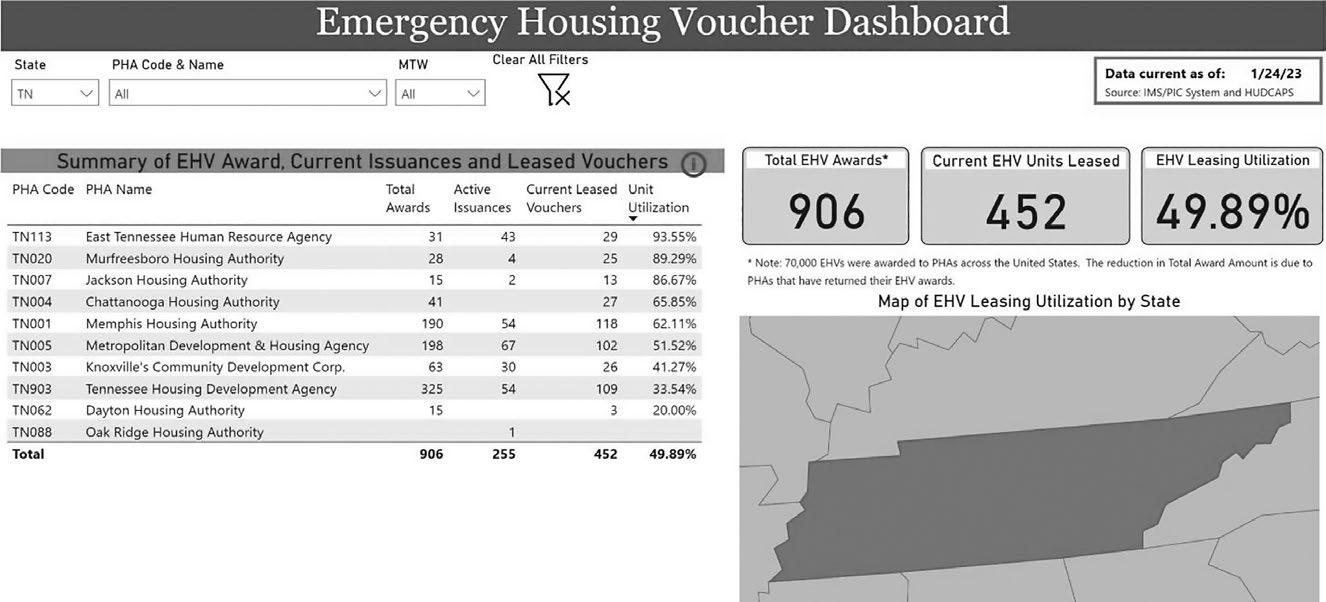
4 minute read
Learn More About
Emergency Housing Voucher (EHV) Utilization
BY JUDITH TACKETT
Last year, we wrote about Nashville’s Emergency Housing Voucher program, a housing subsidy under the federal COVID measures to help address homelessness (see The Contributor’s Volume 16, Number 6, March 16, 2022). In this issue, we’d like to revisit the program and see where it stands about one year later.
As part of the federal COVID response to homelessness, the Metropolitan Development and Housing Agency (MDHA) received 198 Emergency Housing Vouchers (EHVs), which provide additional flexibility to local jurisdictions to serve some of the most vulnerable individuals and families experiencing homelessness or at risk of homelessness including those fleeing domestic violence. The EHVs fundamentally function the same way as Housing Choice Vouchers, also known as Section 8 vouchers, with a few more perks such as sign-up bonuses for landlords and support services dollars, depending on what a local jurisdiction chooses to invest in.

One main difference between EHVs and regular Housing Choice Vouchers is that once a household loses eligibility for an EHV, that voucher will not be renewed. In other words, if, for example, an EHV holder misses the annual recertification process, the voucher will be lost to the local jurisdiction. This is in line with the federal COVID funds that usually are one-time allocations to address consequences from the COVID-19 pandemic and focuses on helping vulnerable populations avoid dire outcomes.
Under Nashville’s EHV program, MDHA provides sign-up bonuses for landlords and is able to pay for application fees, security deposits, utility deposits including up to $500 in utility arrears, and other eligible activities. These costs are in addition to the monthly rent assistance and are paid directly to landlords or utility districts. MDHA received a budget of $3,235,857 for its 198 EHVs and additional budget expenses.
I reached out to MDHA and as of early January 2023, the average housing assistance payment per month to Nashville households served by an EHV was $892. At that point, three EHVs had been terminated. Overall, MDHA said they actually issued 209 EHVs of which 34 have expired and nine have ported out (meaning those households left Davidson County and moved to another jurisdiction. They were able to take the EHV with them). MDHA is doing a good job staying on top of the program. The EHVs must be leased up by the end of 2023 or the unspent dollars (unused vouchers) will be returned to the federal government. That’s why MDHA said they’ve issued the EHVs as quickly as possible to try to minimize any potential risk of losing the vouchers.
However, the fact is that it is hard to utilize all rental subsidies (housing vouchers) because Davidson County, as pretty much any county in Tennessee and nationwide, is experiencing a housing shortage for low-income renters. That’s where the landlord incentives under the EHVs come in.
I would be remiss not to mention Metro’s Low Barrier Housing Collective (LBHC) here. The LBHC was created in 2021 as a collaborative landlord engagement program to encourage landlords to accept housing vouchers from people who transition out of homelessness. Last October, the Metro Council approved a $50-million federal investment package to address homelessness. Of that, $3 million will be invested to further improve the approach to engage and incentivize landlords through the LBHC.
While landlords accepting EHVs receive their own landlord incentives through the EHV program, MDHA coordinates closely with Metro. I don’t want to miss an opportunity to encourage landlords to find out what incentives they can receive for the next couple of years when they accept different housing vouchers. For more information, reach out to MDHA at (615) 252-6517 or ndeep@ nasvhille-mdha.org







